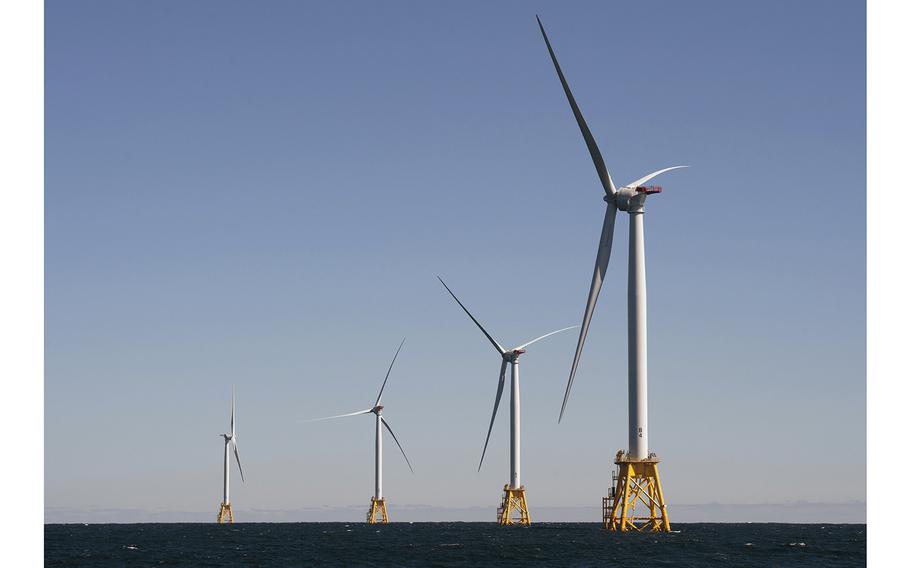
Wind turbines, of the Block Island Wind Farm, tower above the water on Oct. 14, 2016, off the shores of Block Island, Rhode Island. (Don Emmert/AFP/Getty Images/TNS)
The National Congress of American Indians have called for a moratorium on offshore wind development along U.S. coasts, insisting the Biden administration do a better job protecting tribal interests.
The decision by the largest lobbying group for tribes in the U.S. follows a plea Tuesday by 30 New Jersey mayors to halt offshore wind activity so government officials can investigate recent whale deaths. And even before those moves, developers were confronting a slew of economic challenges, from inflation-stoked costs to supply chain woes, that are making it harder to build the nation’s first large commercial wind farms.
Native Americans have complained about being cut out of the planning, permitting and contracting process as developers seek to build more than a dozen wind projects along both the West and East coasts, despite vows by President Joe Biden and top administration officials to consider indigenous knowledge in government decisionmaking. Interior Secretary Deb Haaland, the nation’s first Native American cabinet secretary, also has put a new focus on environmental justice and indigenous rights as head of the department that oversees offshore wind.
The Bureau of Ocean Energy Management emphasized it agreed with NCAI that “tribes must have a seat at the table” and said in an emailed statement the agency is “always working to improve the consultation process.”
“We have taken coordinated actions to incorporate indigenous knowledge and tribal input into our decision making process and we are working to help tribes expand capacity to engage in environmental reviews, work with industry and develop partnerships,” the bureau said. “BOEM is committed to upholding our tribal trust responsibilities and fostering working relationships based on trust and meaningful consultation.”
In its resolution, the National Congress of American Indians urges the agencies to halt all scoping and permitting of offshore wind projects until a “comprehensive and transparent procedure adequately protecting tribal environmental and sovereign interests” has been implemented.
The measure, adopted by NCAI’s general assembly during a just-concluded winter meeting in Washington, D.C., stressed tribal nations “must be included in the management, permitting and development of power purchase agreements.”
The resolution said that includes determining the terms and conditions of those deals — including protections for their environmental and cultural heritage as well as “negotiating fair compensation for the use of their lands and resources.”
Josh Kaplowitz, vice president of offshore wind at the American Clean Power Association, said the industry “is committed to meaningful engagement with tribal nations throughout the consultation process to ensure a just and equitable clean energy transition.”
©2023 Bloomberg L.P.
Visit bloomberg.com.
Distributed by Tribune Content Agency, LLC.